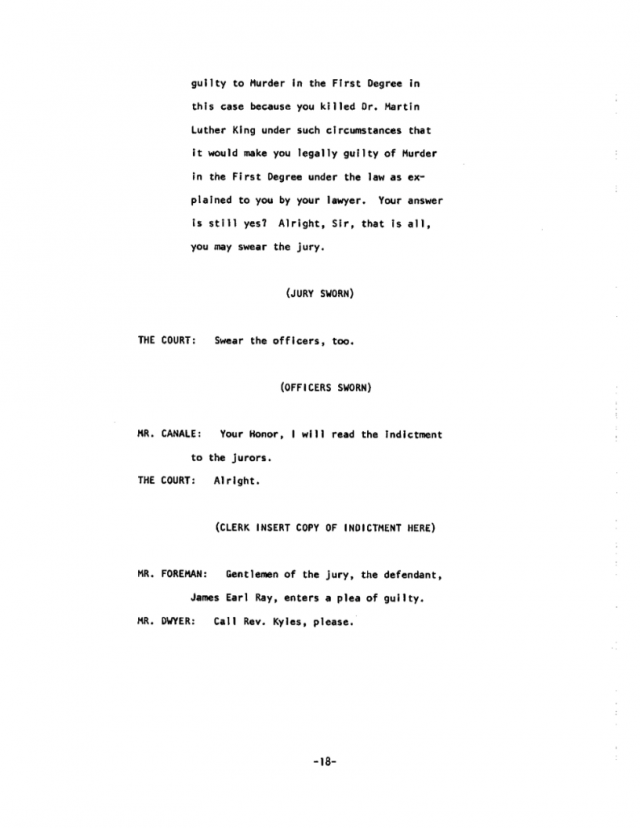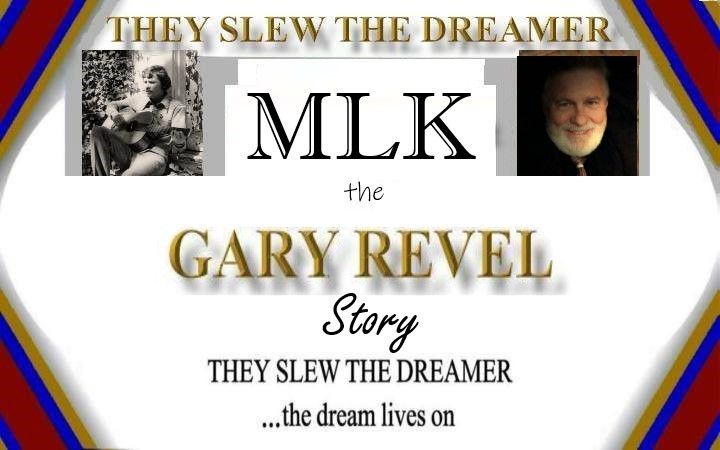District Attorney, Prosecutor Phil M. Canale Jr. Introduces Himself
Canale tells the Jurors that some of them may have heard James Earl Ray was a fall guy in a conspiracy to kill Martin Luther King Jr. This is evidence that the prosecution's case had some problems. And there is more; We now know that they didn't have a murder weapon (the bullet didn't match James' rifle). Of the several witnesses who should have been able to identify James as the assailant, there was no consistent identification between them. This is something a good defense lawyer would have used very effectively. There was no motive; James was not a racist, was not part of a conspiracy which would have been the case if he had been paid to kill MLK, he had nothing against MLK, no personal conflict or any other reason to want the man dead. So, you see here is a case with no motive, no weapon and no identification of James as being the person that shot and killed MLK. No matter how you try to pitch it the prosecution had no case. As a matter of common sense as well as legal precedent there wasn't even enough evidence to arrest the man let along convict him and send him to prison for the rest of his life.

Foreman Brags: He, Canale and Judge Battle Are Saving James Ear Ray From a Death Penalty.

Polling of the Jury


James Earl Ray (surprising Foreman) Stands and Speaks to Judge Battle
This is where James Earl Ray stands up in open court and says he would like to say something then includes that something with the words, "I can't agree with Mr. Clark." His attorney, Percy Foreman, clarifies the statement by saying, "Ramsey Clark". (Ramsey Clark was the Attorney General of the United States who had been consistently declaring that James Earl Ray and James Earl Ray alone killed MLK. James Earl Ray just said in open court that he did not agree with that; meaning he did not agree with the charges against him.
James Earl Ray:
"Your honor, I would like to say something. I don't want to change anything I have said, but I just want to enter one other thing. The only thing that I have to say is that I can't agree with Mr. Clark.
My notes: 2 things here; and I asked James about this myself. He said, "I don't want to change anything I have said..."; What he meant, and he will refer to this again shortly, is that he had said that he was 'legally guilty' as explained to him by his attorney, Percy Foreman. His attorney had explained it to him this way; James, your an escaped convict and were at the scene sometime around the shooting, they found the murder weapon (Which was a lie, to this day the gun has not been proven to be the murder weapon. The bullet still doesn't match the rifle.) and can prove you bought it and it has at least one of your fingerprints.
His attorney went through a litany of evidence and threats to convince James that he would go to the electric chair if the case went to trial (Again a lie. I have went over this case with many defense attorneys and once they see the whole thing they all agree that it would be hard for the prosecution to get a conviction if it went to court.).
James was saying that he pled 'legally guilty' because he was somehow involved but did not really know how he was involved. Without knowing the weakness of the case against him and under the duress and threats against him, even though he did not shoot King, he felt he had to plead 'legally guilty' as explained to him by his attorney.
The 2nd thing-at this point James said, "I can't agree with Mr. Clark." He was talking about Attorney General of the United States Ramsey Clark. Ramsey Clark had been quoted in the press as saying that there was no conspiracy and that James Earl Ray and James alone had shot and killed MLK. Here James is saying that he did not agree with that theory; that he had killed Martin Luther King Jr. and that there was no conspiracy. James Earl Ray was hereby saying he did not agree with the very 'quilty plea' his attorney was forcing upon him. A judge in any court trial should certainly at this point realize that the defendant was not pleading guilty to the crime for which he was being tried and stop the proceeding until the matter is cleared up.

This is me, Gary Revel, in one of my less stressful moments.

Judge Battle Appears Confused
and Asks, "Mr. Who?" Ray Replies, "Mr. J. Edgar Hoover, I agree with all these stipulations and I am not trying to change anything."
My note: Judge battle didn't seem to understand so James added, "J. Edgar Hoover." Both FBI Director and Ramsey Clark had been quoted in the press and on television news as saying that there was no conspiracy and that James and James alone was the assassin. Then James says, "I agree with all these stipulations and I am not trying to change anything." (But in fact he was absolutely changing his plea.) He had been told by his attorney that these stipulations his attorney had him sign clearly showed the court that he was pleading 'legally guilty' because he was somehow involved but James understood that he was not pleading guilty to killing MLK himself. He made it clear before the court that he did not agree with FBI Director J. Edgar Hoover and Attorney General Ramsey Clark that he killed MLK and that there was no conspiracy.
The Judge says, "You don't agree with those theories?
My note: Here Judge Battle is talking about the theories (theories, because they had not been proven one way or the other) by Hoover and Clark that, There was no conspiracy and that James Earl Ray and James Earl Ray alone shot and killed MLK.
James answers; Mr. Canale's, Mr. Clark's, and Mr. J. Edgar Hoover's about the conspiracy. I don't want to add something on that I haven't agreed to in the past.
My note: This time he adds Mr. Canale. Philip Canale was the prosecutor of the case standing there in court prosecuting James for the crime of killing MLK without anyone else being involved. James is saying here that he did not agree with the charge being brought against him and therefore didn't agree that he was pleading guilty as charged. He knew, of course, that there were others who conspired to kill King but he didn't shoot MLK himself. What you have here is a person before the court with a jury present saying he thought he was pleading 'legally guilty; to a charge that wasn't before the court. Think about this, how can a man plead guilty to a charge when he doesn't agree that he is pleading guilty to that charge but instead thinks he is pleading guilty to another charge, 'conspiracy'?
(Mr. Canale, Mr. Clark and FBI-Federal Bureau of Investigation Director-Mr. J. Edgar Hoover were all quoted in the press as saying that there was no conspiracy and that James and James alone killed MLK) James Earl Ray is clearly pleading guilty to conspiracy rather than the charge before the court that he and he alone killed King. James Earl Ray told me that he thought he had agreed to being involved in the assassination due to his proximity and contact with those who killed King. He had signed stipulations given him by Foreman that he believed established that; hence his statement; "I don't want to add something that I haven't agreed to in the past.
James told me that at this point, "Percy Foreman put his hand on my shoulder pushed me down into my seat."
Foreman then tells the court that he thinks Ray is saying that he doesn't agree that the Attorney General Ramsey Clark or J. Edgar Hoover is right (about James and James alone being the killer of MLK). Then says, I didn't argue that as evidence in this case, I simply stated that under riding the statement of General Canale that they had made the same statement. (James said that this is where Foreman still with his hand on James shoulder and bringing significant force with his hand to make his point turned to him and finished with) "You are not required to agree with it at all."
This in fact and full legal consequence was a lie to James Earl Ray in open court. Of Course he had to agree that he and he alone killed MLK because that was the charge and was what he was supposed to be pleading guilty to.

Page 18 of James Earl Ray Guilty Plea
Judge battle asks the question if James was guilty of murder because, "...you killed Dr. Martin Luther King under such circumstances that it would make you legally guilty of murder in the first degree under the law as explained to you by your lawyer." Your answer is still yes? Alright, Sir, that is all, you may swear the jury."
Judge battle asked the question but got no reply from James because James told me at that point his attorney Percy Foreman was forcing him to keep his seat by pushing on his shoulder and he was confused and really did not understand what was going on, but notice, he did not at that point say, "Yes." to the Judges question because he was really unsure about what he was pleading guilty to. He told me that he did not nod or give any indication that he was then pleading guilty. He said the judge then glanced at him briefly and went on to swearing the jury without getting his reply to this final question. He became certain at this point that in fact he didn't agree with the charges. James had made several attempts to explain that he wasn't pleading guilty to killing MLK himself and the judge was clearly frustrated, James attorney was grasping James shoulder which to James meant for him to shut up and the court was proceeding without James pleading guilty as charged.
Judge Battle then went through the ceremony of asking James if he was pleading 'legally guilty' and Ray remembered that he just sighed and withered in his seat but never said a word or even made a gesture that he agreed he was then pleading guilty.
(It was at this point that Judge Battle should have stopped the proceeding and found out for sure if James Earl Ray was pleading guilty because he believed that he was involved in a conspiracy or if James Earl Ray was truly pleading guilty to killing Martin Luther King Jr. himself. This was a sad day in the history of our country and especially in the history of our courts, judicial system and our government. Because of Judge Battle's failure to proceed in a judicious manner we are still paying the price that comes with courtroom corruption.
Witnesses were then called to provide some credibility to the shameful judicial circus that was going on and ultimately James Earl Ray was sentenced to 99 years in prison (without a trial). He stayed in prison and died in prison almost 30 years later.
If any court in this land is engaging in this kind of judicial practice today then my friends we are not getting justice; what our courts are doing to us all (and what was done to James Earl Ray) is a farce, a fraud and a corruption of the very intents of the Constitution of the United States of America.
Note: James' father, George Ellis Ray, was still alive when James went to prison. Prior to his death he was asked hundreds of times about his son's ability to pull off the MLK killing. He consistently maintained that, "He couldn't have planned it alone, he wasn't smart enough."
In a River Front Times article by Ellis E. Conklin, published: April 02, 2008, James’ brother, John, put it this way;
“James got caught up in something he didn’t understand. He didn’t know what was going down. He just thought he’d be the getaway driver. He was never a racist. Never.”
Let us not seek the Republican answer or the Democratic answer, but the right answer. Let us not seek to fix the blame for the past. Let us accept our own responsibility for the future.
John F. Kennedy
JFK HEADSHOT - CLEARLY FROM THE RIGHT FRONT

Zorro: The Unveiling of the Killing of King by Patrick Wood brings the hidden details of the 1977 Gary Revel investigation of the assassination of Martin Luther King JR. to light. He is writing and publishing the story in chapters in a way that brings to life the intimacy of Gary's dangerous quest of finding the truth and more. To begin your own personal journey Click Here to Read.
Page 1 |Page 2
|Page 2 |Page 3
|Page 3 |Page 4
|Page 4 |Page 5
|Page 5 |Page 6
|Page 6
MLK Assassination Investigation Links
Bill Stout, CBS Reporter, interviewed Charlie Stevens who said James Earl Ray was not the killer.
Copies of pages from the transcript of the James Earl Ray guitly plea hearing and analysis by Special Investigator Gary Revel
Dark Arts of Assassination by Patrick Wood
Investigating the Assassination of Martin Luther King Jr. - People get Killed
J Edgar Hoover's FBI Destroy King Squad
Leutrell Osborne Finds Disturbing New Details Investigating Martin Luther King Jr. Assassination
MLK Conspiracy Trial-Transcript
Mystery Helicopter and Riot Control in Memphis During March with MLK
New Questions About E. Howard Hunt And MLK Assassination-A Gary Revel Commentary
Pictures of Assassins
The Case Against James Earl Ray: Anyalysis by Martin Hay
The Deadly Business of the Murder of Martin Luther King Jr.
They Slew the Dreamer - Lyrics and History
Warden Swenson was paid by J. Edgar Hoover to help James Earl Ray escape. Here is the set up to his role as patsy in the MLK assassination.
JFK Assassination Investigation/Research Links
3 Tramps in Dealy Plaza: What are they to JFK killing
Adam Gorightly Interview by Investigative Journalist Bob Wilson
Abraham Bolden-Book Review-Echo From Dealey Plaza
Anti-Castro Cuban exile, Antonio Veciana met with CIA Handler and Oswald
Badgeman: Do you see him and did he kill JFK?
Beverly Oliver Interview-Eyes Wide Shut
Carlos Marcello's Hideout in Swamp by Gary Revel
Chief Curry, the FBI and Assassination of JFK
Christopher Dodd and the MLK/JFK Assassinations
Conspired to Kill: Opinion by Gary Revel
Deep Throat Surfaces - Watergate and Assassinations
Download PDF of the CIA's FAMILY JEWELS - FREE
Gayle Nix Interview-JFK Assassination
How the CIA Kept Secrets From the HSCA
Interview of Gary Revel on guilt/innocence of Lee Harvey Oswald
Interview of Joan Mellen
Interview of Joseph Mcbride
Into the Nightmare-Mcbride Book Review
JFK and RFK: The Plots that Killed Them, The Patsies that Didn’t by James Fetzer
JFK: Antonio Veciana and Lee Harvey Oswald and the CIA
JFK: Antonio Veciana's book, 'Trained to Kill' more evidence of CIA involvement of JFK assassination.
JFK Assassination Bullet Fragment Analysis Proves Second Shooter
JFK Assassination Film
by Orville Nix with interview where he says the shot came
from the fence not the Texas Book Depository.
JFK: In The Light of Day by Gary Revel
JFK: In The Light of Day Update by Gary Revel
JFK Assassination Investigation Continues
JFK: Robert Kennedy-Rollingstone Article
JFK: The Real Story-Movie Project
JFK: Through the Looking Glass Darkly
John Whitten: How the CIA Helped Kill JFK and Keep Their Guilt Hidden
Judd Apatow tweets his displeasure with theaters delaying opening of THE INTERVIEW (movie about a CIA plan to assassinate North Korea's Kim Jung Un) due to the GOP's terrorist threats.
Mikhail Kryzhanovsky tells it like it is.
Mort Sahl Interview
Officer of the Year: Roger Craig, Dallas Policeman and Mystery Witness of JFK Killing
RED POLKA DOT DRESS: Movie project, the mystery of the assassination of Senator/Presidential Candidate Robert F. Kennedy; screenplay by Frank Burmaster and Gary Revel.
Russo, Oswald, Ferrie and Shaw
Shane O'Sullivan Interview
The business of murder related to Santo Trafficante, the Mafia, the CIA, JFK, MLK and RFK
The Girl on the Stairs says Oswald did not pass her after the shooting of JFK
The Mystery of Roger Craig and the JFK Assassination
Was Demohrenschildt CIA and Part of JFK Assassination Team?
Why and How the CIA Helped Assassinate JFK
John Lennon Assassination
A Not So Funny Thing Happened: (WHILE LOOKING INTO THE MURDER OF AN EX- BEATLE)
John Lennon and ...
John Lennon killing, Wanna be a hero?
More Interesting News-Commentary-Perspective from Gary
Deep Throat Surfaces - Watergate and Assassinations
'SOMEONE IS HIDING SOMETHING' by Richard Belzer, David Wayne and George Noory.
Is the disappearance of a commercial airliner with over 200 people on board no more important than a fender bender? This book draws a staggering conclusion that some may want us to believe this airline tragedy isn't even that important.
Photos, pictures, art, books, poetry, news, and more at the Gary Revel PINTEREST Website.
Embrace ... Concept Art by Gary, Canvass, Posters, Prints ... on sale at Zazzle-Click Here
Gary Revel found links to those responsible for the assassinations of JFK, MLK, RFK, John Lennon and the attempted killing of President Ronald Reagan.
Owner of Jongleur Music Group of companies that includes music publishing/production/distribution, movie development, and book publishing.
https://garyrevel.com
Email: gary@garyrevel.com
Website Copyright 2006 - 2022 by Gary Revel




















